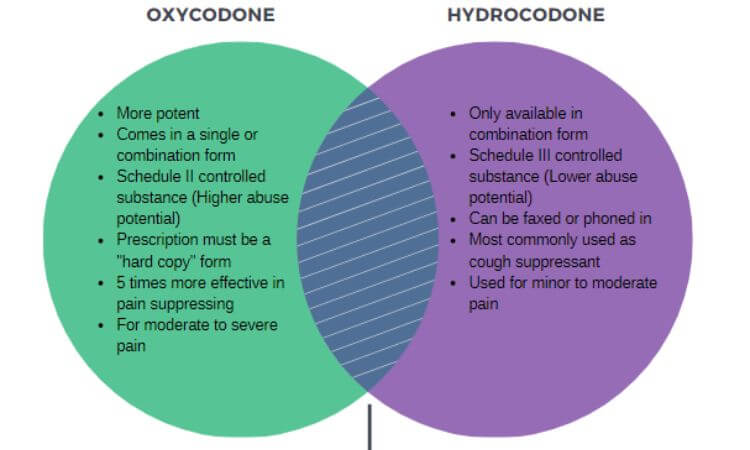Table of Contents
Hydrocodone vs. Oxycodone High: Is There a Difference?
Is OxyContin a hydrocodone?What’s the difference between OxyContin and oxycodone?Are OxyContin and hydrocodone similar?What is the strongest pain medication?Is Tramadol stronger than hydrocodone?
Opioids such as hydrocodone and oxycodone can both alleviate pain and provide euphoria to the user. The following information will inform you of the key distinctions between the two types of drugs:
According to the National Institutes of Health, oxycodone and hydrocodone are both types of opioids that have a significant potential for abuse and addiction. Because of the high degree of similarity between the two medicines, there is no one set of symptoms that can be used to definitively differentiate between the effects of oxycodone and those of hydrocodone. The following is important information regarding the two medications:
DO NOT MISS: Back Spasms: What You Need to Know
What is Hydrocodone?
Hydrocodone is a medication that, according to the National Center for Biotechnology Information, alleviates pain by connecting to opioid receptors in the central nervous system. It has a tendency to slow down biological activities including digestion and breathing. [Case in point] Additionally, it has the ability to calm coughing.
Hydrocodone and acetaminophen are both components of a number of branded medications, including Vicodin. Even in relatively low doses, acetaminophen has the potential to cause life-threatening liver damage or failure, according to an article that was published in the Journal of Clinical and Translational Hepatology in 2016. The article states that there is evidence to suggest that this possibility exists.
What is Oxycodone?
Oxycodone is a medication that can reduce activity levels not just in the central nervous system but also in other parts of the body. According to the National Center for Biotechnology Information, it can also suppress coughing.
Oxycodone may be prescribed by a doctor either on its own or in combination with acetaminophen. Some medications, like Percocet, include both oxycodone and hydrocodone.
According to the FDA’s cautions, taking acetaminophen with oxycodone increases the risk of experiencing an overdose as well as causing damage to the liver. This is also the case with hydrocodone.
YOU MAY LIKE THIS: Buspar Tablet – Uses, Side Effects, Warnings, and More
What’s the Difference?
Both oxycodone and hydrocodone are classified as opioids, which are medicines that share many chemical similarities with one another. Because of this, the consequences of getting high on hydrocodone are quite comparable to the symptoms of getting high on oxycodone.
The following are some of the potential adverse effects that can be caused by taking both drugs:
The mouth is dry
sickness and throwing up
Rhythmic shifts in the heartbeat
Hives
The face, lips, and tongue may swell up.
Difficulty in either breathing or swallowing
Hydrocodone, on the other hand, is more likely to cause fatigue as a side effect, and oxycodone is more likely to cause side effects such as sleepiness and constipation.
The manifestation of these symptoms can be influenced by a variety of factors, including the dosage that you take as well as whether or not you administer the medication intravenously or orally. In addition, an addiction specialist at Lin and Aaron Coaching named Aaron Sternlicht, LMHC, CASAC, told WebMD Connect to Care that the symptoms of a high from oxycodone or hydrocodone will vary more on the following than on which medication you use:
- How much you weigh
- Your previous struggles with substance abuse
- Regardless of whether you use one drug in conjunction with another prescription,
- Dosage
- Whether the drug formulation is one that allows for immediate release or one that allows for the gradual release
Sternlicht adds that in his experience, people who abuse opioid medications to get high prefer oxycodone because it can be abused more easily than other formulations of the medication, such as OxyContin, Percocet, and Roxicet. “In my experience,” Sternlicht says, “people who abuse opioid medications to get high prefer oxycodone.”
HERE MORE: Zyprexa – Uses, Side Effects, Warnings, and More
What to Look For
Abuse of either drug can eventually lead to dependency on that drug. 128 people in the United States pass away from an opioid overdose every single day, as reported by the Centers for Disease Control and Prevention (CDC). It is more likely that you will overdose as your dependence on the substance increases since you will require a bigger amount to achieve the same high. The following symptoms may be brought on by taking an excessive amount of either drug:
- Weakness or dizziness
- a rhythm that is sluggish
- Difficulty with breathing
- Skin that is icy and damp
- Seizures
If you or a loved one are experiencing signs of an opioid overdose, do not be afraid to call 911 or the emergency services in your area for assistance.
Don’t Make Me Wait. Get Help.



